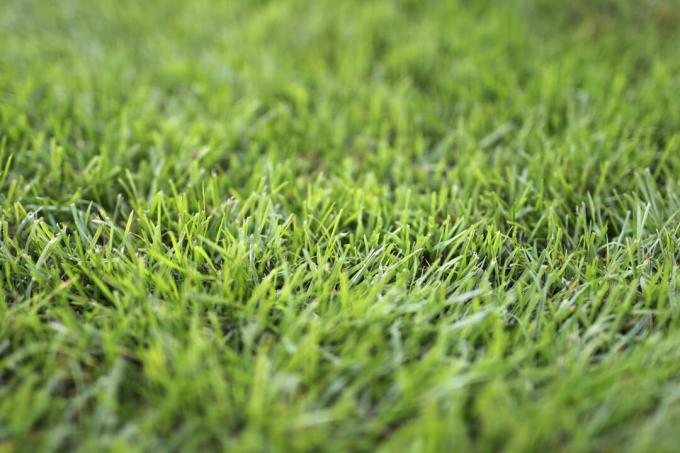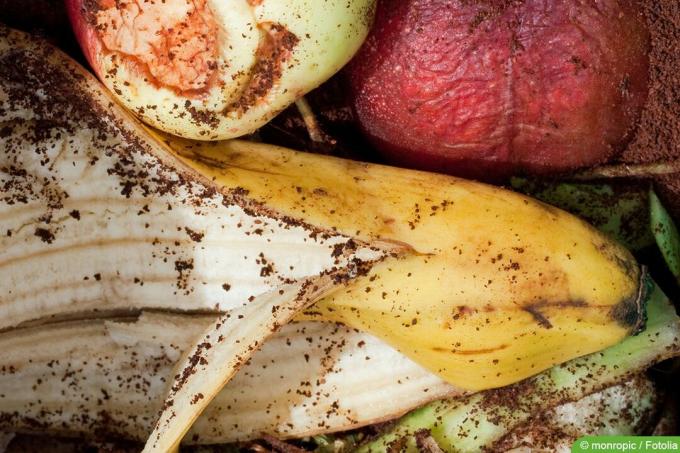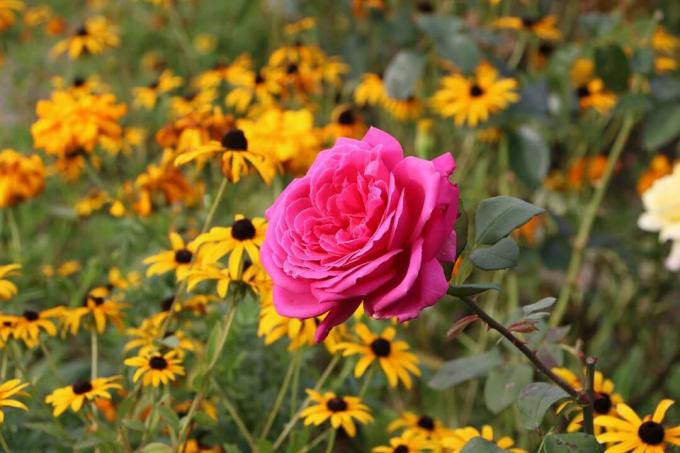

Table of contents
- Crap is not the same as crap
- What to do with the crap?
- Which fertilizer for which plant?
- Use horse manure and cow manure correctly
- Natural benefits for the garden
- Worth knowing about horse and cow manure shortly
Experts assume up to 15 million tons of horse manure per year in Germany. The amount of cow dung produced annually is even higher. The daily output per cow is between 15 and 20 kilograms.
Crap is not the same as crap
The composition and nutrient content of the animal excreta varies depending on the type of husbandry, bedding, feeding, storage and manure. The different digestive systems of horses and cattle, which are ruminants, also produce different manure. The horse manure is characterized by a high nitrogen content. He has many undigested plant parts such as seeds and is with litter and straw mixed up.
The mineral content of cattle manure is more balanced than that of horse manure. It contains a lot of potassium. However, if it comes from stables with factory farming, it may contain residues of medicines or other chemicals.
What to do with the crap?
- Both horse and cow manure are suitable for use in the garden.
- However, the hobby gardener should never apply the fertilizer freshly, but first compost.
Mineral fertilizers dissolve in water. In contrast, organic fertilizers first need to be decomposed by the microorganisms in the soil. Although this process is lengthy, it also reduces the risk of over-fertilization. During storage, e.g. B. in a dung pit, the strawy parts crumble. When the straw components and manure can no longer be distinguished on top of the compost, it is well seasoned and ready for application.
- Not only is fresh cow dung too pungent for plants, it also generates a lot of heat as it decomposes.
- With horse manure, the heat development is particularly high. This makes it the ideal fertilizer for cold frames.
It covers the bed like a warming blanket. So that it can unfold its warming effect, you should store the horse manure in an airy place in winter. This delays the rotting process and thus the release of heat. The natural heating based on horse manure only starts when it is spread on the cold frames. However, too much heat can destroy the roots of the plants.
Which fertilizer for which plant?
If you want to grow cabbage, tomatoes or cucumbers in the cold frame, you should choose the "hot" horse manure. The heat from its decay supports plant growth. Likewise, radishes, lettuce and spinach, and even strawberries grow well with horse manure. As with the plants from cold frame the gardener is better off using stored horse manure or liquid manure than a fresh mixture of horse manure and straw. Rose and orchid growers also appreciate horse manure. The nutrients in horse manure fuel the growth and flowering of the flowers. In addition to the minerals, the manure supplies the plants with fungi, bacteria and hormones.
Cow manure is an all-purpose fertilizer and can be used anywhere. It is well absorbed by almost all soils and plants. Its effect is long-lasting and does not stop after a few weeks like horse manure. Cow dung binds loose sandy soil and loosens clay soil. It has a cooling effect on marl and limestone soils.
Since soil and plants need different nutrients, many gardeners mix several types of manure. If, in addition to the heat supply, a high proportion of potash and nitrogen is important, then horse manure can be mixed well with manure from sheep, goats and Rabbits mix up The addition of poultry manure increases the proportion of phosphorus and trace elements.
Use horse manure and cow manure correctly
When spreading animal manure in the home garden, the following must be observed:
- Use only settled, composted animal manure.
- Always work the manure into the soil on beds. On the one hand, the undermining reduces the odor nuisance.
- Much more important from a gardener's point of view, however, is that the microorganisms in the soil have better access to the manure.
- If you decide to store on the ground, put a layer of dung about 5 cm thick on the bed.
- Never cover sprouts and leaves with manure!
- Do not put any fertilizer directly into the planting hole. This is especially true for trees and perennials.
- Change manure in cold frames every spring.
The trade now offers animal manure in dried form. The storage and handling of these pellets is very simple and is described in detail on the packaging.
Opinions differ on the time for optimal fertilization – whether before winter or in spring. The main reason for applying the fertilizer before winter is its antifreeze effect. In addition, it can constantly release nutrients into the soil over the winter months. The soil is then optimally prepared for the start of the growth phase. On the other hand, the nutrients in the manure – which are actually important for the growth phase – are washed out by snow and rain over the winter. In addition, the warming effect is usually limited to a few weeks.

If you want to spread your manure over a large area on fields or pastures, you cannot do this as you see fit in your own garden, but must observe the fertilizer ordinance. It determines which nutrient quantities are permitted per hectare.
For farmers who want to sell their excess manure, the regulations on the placing of fertilizers on the market are binding. From the type of fertilizer to the net weight, the composition to the origin and date, the seller must label the manure in detail and have it recorded on a delivery note.
Natural benefits for the garden
Animal manure is a renewable resource. It provides the soil with nutrients and organic substances in a natural way. Over-fertilization or damage to the soil and plants is hardly possible when spreading cow dung and horse manure. On the contrary: Organic fertilizers maintain and improve soil fertility.
The recycling of manure in the garden or in the field is effective and inexpensive. It also reduces the waste problem. Admittedly, composting and spreading the manure is time and labor intensive. Those who shy away from this effort can fall back on industrially produced dry pellets. They are also less odorous.
Worth knowing about horse and cow manure shortly
- Horse manure is horse excrement mixed with straw. Cow dung is the excrement of cattle.
- If the weather is damp, the cow dung decomposes in a period of approx. two to three months.
- Cow dung offers a habitat for numerous insects. Over-fertilization occurs around such a cowpat.
- The result is that the grass grows particularly lush in the places where the cows have left their excrement on the pasture.
- If the weather is dry, cow dung can also dry up. These can then be used as fuel, for example.
So cow pats still have today in numerous high mountain regions in India, in Turkey and in Tibet, but also in different regions of the Alps are still of considerable economic importance and find dried as heating material Use.
Many, especially organic gardeners, are looking for alternative fertilizer methods, so-called organic fertilizers. This includes horse manure and cow manure. Horse manure is relatively easy to obtain, because in agriculture and also on horse farms there are usually huge amounts of horse manure over the course of a year. The amount of manure produced in agriculture over the course of a year - caused by horses, pigs and cows - can sometimes become a problem, because not all of the manure that accumulates can be used by the farmers themselves the fertilization are used, although horse manure and cow dung as fertilizer is widespread in agriculture.
In addition, many small and hobby gardeners are now also happy to take advantage of the offers of some farmers and help themselves to the manure heaps around the corner. According to experts, horse manure is the best manure to use for fertilization Fresh horse manure still has a very high percentage of ammonia, in contrast to horse manure that has already partially decomposed horse manure.
 garden editorial
garden editorial I write about everything that interests me in my garden.
Learn more about fertilizing

Make effective nitrogen fertilizers yourself lawn fertilizer
In order to develop optimally, plants need sufficient nutrients. For example, nitrogen, one of the main nutrients, is indispensable. If this is not present in sufficient quantities in the soil, satisfactory growth cannot take place. As a result, it must be delivered.

Dried banana peel as fertilizer | Application tips
Bananas are popular and healthy. The banana peel usually ends up in the trash. But it is far too good for that, because the dried shells are an excellent fertilizer for a variety of garden plants.

Horn meal: with fertilizer against clover in the lawn | 7 tips
In the lawn, clover is usually undesirable. With too little fertilization, however, it spreads quickly. Horn meal can help as a biological fertilizer. See this article for tips on how to use it.

Unusual Fertilizers | 13 home remedies that can do more
Much of what accumulates in the household and usually ends up in the organic waste bin can be used to fertilize garden and/or indoor plants. They offer an ecological alternative to mineral fertilizers and score with environmental compatibility and sustainability.

Fertilizer for roses: 15 home remedies for fertilizing roses
In addition to rose fertilizer, numerous home remedies are also suitable as nutrient suppliers for roses. We present the most popular ones in this article!

Fertilize properly | What good is low-nitrogen fertilizer?
No plant can survive without nutrients. Only with optimal and needs-based care can they develop magnificently, bloom lavishly and bring rich harvests. As a result, fertilizer plays an important role in care, provided the ingredients and dosage are right.



